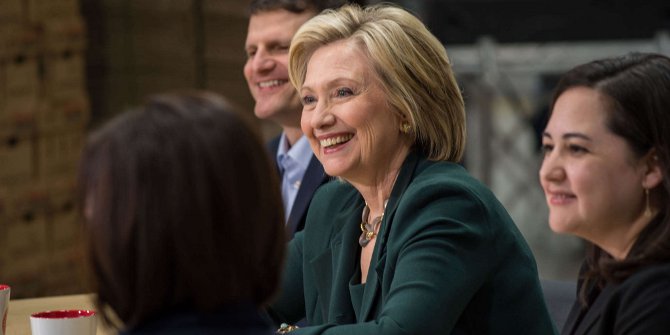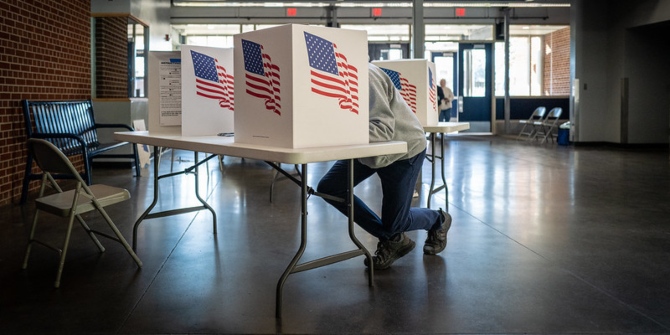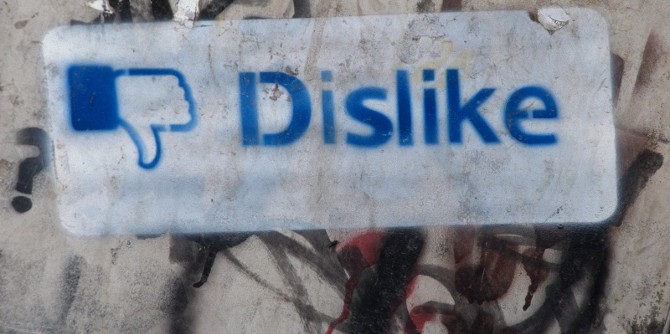 Last Sunday, the former Secretary of State, New York Senator, and First Lady, Hillary Clinton, announced that she was running for the Democratic nomination for the 2016 presidential election. Lori Cox Han takes a critical look at the notion, put forward by many, that Clinton’s nomination and win are ‘inevitable’. She argues that her name recognition is an asset, but also a liability given the risk of ‘Clinton fatigue’ among Democratic voters. She writes that Clinton not only faces trust issues, but she also has yet to articulate why she is running, which could be problematic given the left wing of her party’s preference for others such as Senator Elizabeth Warren.
Last Sunday, the former Secretary of State, New York Senator, and First Lady, Hillary Clinton, announced that she was running for the Democratic nomination for the 2016 presidential election. Lori Cox Han takes a critical look at the notion, put forward by many, that Clinton’s nomination and win are ‘inevitable’. She argues that her name recognition is an asset, but also a liability given the risk of ‘Clinton fatigue’ among Democratic voters. She writes that Clinton not only faces trust issues, but she also has yet to articulate why she is running, which could be problematic given the left wing of her party’s preference for others such as Senator Elizabeth Warren.
After months of endless speculation, the worst kept secret in American politics is out—Hillary Clinton is officially running for president. Since her video announcement on April 12th, there has been no shortage of opinions about Clinton’s chances of winning in November 2016. Political punditry notwithstanding, we can learn much more about the viability of Clinton’s candidacy from relevant political science research and an analysis of past campaigns.
Clinton’s strengths as a candidate are obvious. She is one of the most formidable women in American politics, she can raise large sums of money necessary to finance an effective presidential campaign, and she is an experienced and battle-tested public figure. She has legislative and foreign-policy experience (though not a long list of specific accomplishments from either her time in the U.S. Senate or as Secretary of State), and she was as involved in presidential policymaking as much as any First Lady since Eleanor Roosevelt.
However, a closer look at Clinton’s qualifications reveals inherent weaknesses on many levels. Clinton’s star power and name recognition come at a cost. Ideally, presidential candidates should begin with a clean slate in presenting their agendas to the American public. No matter how many times Clinton hits the reboot button, her long and complicated history as a public figure cannot be ignored. Likewise, her husband’s baggage from his time as president is a problem that won’t go away. This will inevitably increase what is commonly known as “Clinton fatigue” among some voters. Perhaps most importantly, she’s not a skilled campaigner. Though she may have the ability to govern, she could lack the skill to run a successful campaign.
Like her husband, Clinton suffers from self-inflicted wounds and a lack of credibility regarding some of her professional decisions. Voters have not heard the last of Clinton’s e-mail scandal or questionable donations to the Clinton Foundation during her tenure as Secretary of State. Gaffes like her complaint about being “dead broke” after leaving the White House, or her more recent claim that businesses don’t create jobs, continue to provide ammunition to Clinton’s detractors. Even the recent scandal at NBC involving Brian Williams and his embellishments about his reporting during the Iraq War reminded people of Clinton’s own exaggeration on the 2008 campaign trail about an alleged firefight during her visit to Bosnia in 1995. In the end, these gaffes may not matter, but they remind voters of the things they like least about Clinton.

Americans want presidential candidates who are trustworthy, and polling suggests Clinton falls short in this category. The same polling also suggests Americans need to like our presidential candidates. Clinton is often labeled as “divisive” and “polarizing,” and people are rarely lukewarm about her; she is either loved or hated, with no middle ground. We also like candidates who represent change, are fresh faces, and can offer new and innovative ideas. Unfortunately for Clinton, her campaign has a “been there, done that” feel to it.
In addition, Clinton has yet to clearly articulate why she is running. Compelling narratives matter in presidential politics. Ronald Reagan in 1980, George W. Bush in 2004, and Barack Obama in 2008 all had clear messages and strong narratives driving their campaigns. Clinton’s campaign launch via social media did little to convince voters why she should be president. If anything, many more questions than answers remained for anyone watching the announcement video as the candidate herself was the least visible optic in the entire presentation.
A lack of viable competitors for the nomination is also not helpful, nor is it good for the Democratic Party as a whole. The result will look more like a Clinton coronation than a democratic selection. A competitive primary energizes voters, revs up the base, and gets people out on Election Day. If Clinton faces no serious challengers, the Democratic Party will not have an adequate ground game that helps down-ballot candidates at the state and local levels. Furthermore, Clinton is not the preferred candidate of the liberal wing of her party. Many on the left see her as too hawkish on foreign policy and too cozy with Wall Street, which is why talk of a candidacy from Massachusetts Senator Elizabeth Warren refuses to die. A lack of excitement within the Democratic base leads to lower voter turnout, which tends to favor Republicans in a general election.
As of now, Clinton is the overwhelming favorite to win the Democratic nomination. She hopes that, unlike in 2008, focusing on gender as a key issue in her campaign will broaden her appeal, especially among voters eager to elect the first woman president. Nevertheless, as in any campaign, much can happen between now and November 2016. Clinton may generate enough excitement as a potential woman president to easily capture the Democratic nomination and then beat her Republican challenger. On the other hand, “another round of incoming” (as Bill Clinton’s advisors referred to the recurring scandals during his campaign and presidency) could derail the Hillary juggernaut. Nothing in politics is inevitable, and these are the Clintons, after all. In the end, more than anything else, the fact that she is a woman may not be enough to overcome the fact that she is a Clinton, which may be the ultimate deciding factor.
Please read our comments policy before commenting.
Note: This article gives the views of the authors, and not the position of USApp– American Politics and Policy, nor of the London School of Economics.
Shortened URL for this post: http://bit.ly/1JmM5c0
_________________________
 Lori Cox Han – Chapman University
Lori Cox Han – Chapman University
Lori Cox Han is Professor of Political Science at Chapman University in Orange, California. She is the author of several books, including “In It to Win: Electing Madam President” (Bloomsbury, 2015) and “Presidents and the American Presidency” (Oxford University Press, 2013).






